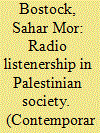| Srl | Item |
| 1 |
ID:
186828


|
|
|
|
|
| Summary/Abstract |
This study explores the use of multiple reactive tokens (duis) in responsive turns in Mandarin, particularly in the sequential and interactional environments that project them in daily interactions. Data analysis of over 100 unscripted conversations between two or three native speakers indicate that an increase in the number of duis co-occurring corresponds to a higher level of listenership, resulting in a hierarchy of displayed stances ranging from neutral to active to affiliative. I argue that almost no practice of multiple duis in conversation is guaranteed to work mechanistically and automatically, as it requires at least a two-party collaboration. Multiple duis as reactive tokens in interaction are systematic, conversationally strategic, and sequentially as well as socially organized. Furthermore, they are recurrent patterns at the discourse level that must be recognized as routine practices in conversation, as their format can help accomplish unique interactional tasks that exhibit strong coherence and utility at the interactional level.
|
|
|
|
|
|
|
|
|
|
|
|
|
|
|
|
| 2 |
ID:
190979


|
|
|
|
|
| Summary/Abstract |
This article examines the reception of radio in Palestinian Arab society from the 1930s until the 1948 war. The article breaks new ground by reconstructing the geographical distribution of radio sets throughout Mandate Palestine and analysing the practices of radio listening. The article argues that radio built on earlier forms of communication and entertainment and depended on existing cultural practices to reach Palestinian society. Radio listening often took place in public spaces and overlapped with the consumption of other media, such as communal newspaper reading. The impact of listening in public was twofold: first, access to radio was shaped by existing social and economic hierarchies and consequently reinforced them; second, public radio listening encouraged critical media reception and cultivated political debates. This way, Palestinians undermined the intentions of the colonial government and used radio for their own ends. By investigating the experiences of radio listeners in Palestine this article sheds light not only on the cultural life of Palestinian Arabs during the British Mandate, but also on the multi-layered, multi-directional workings of media in colonial contexts.
|
|
|
|
|
|
|
|
|
|
|
|
|
|
|
|